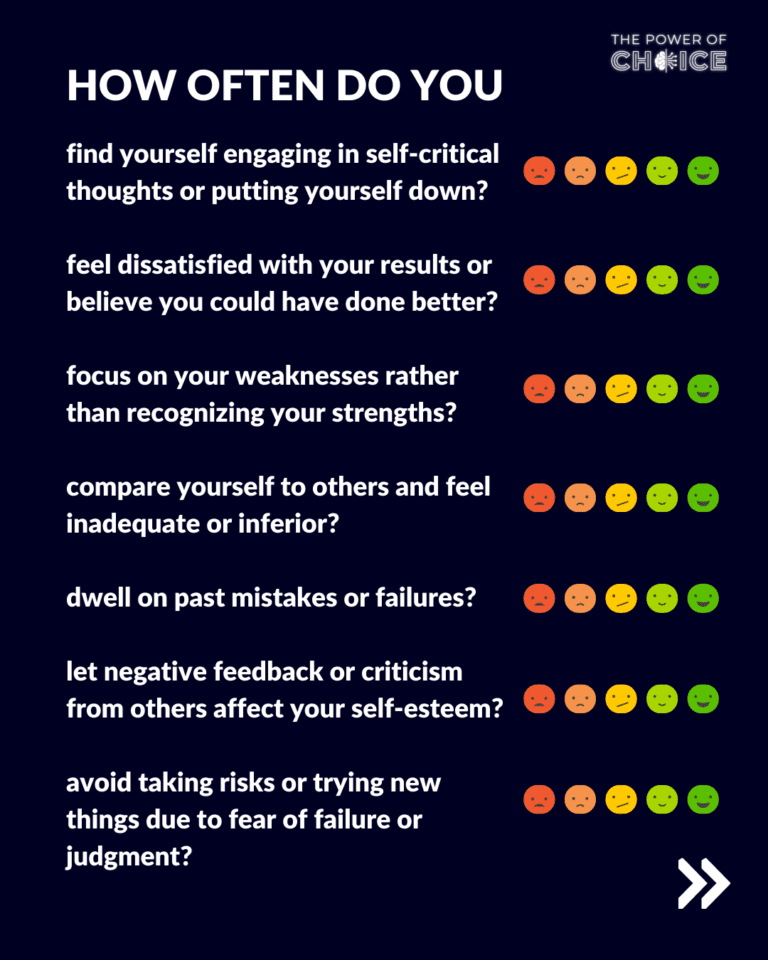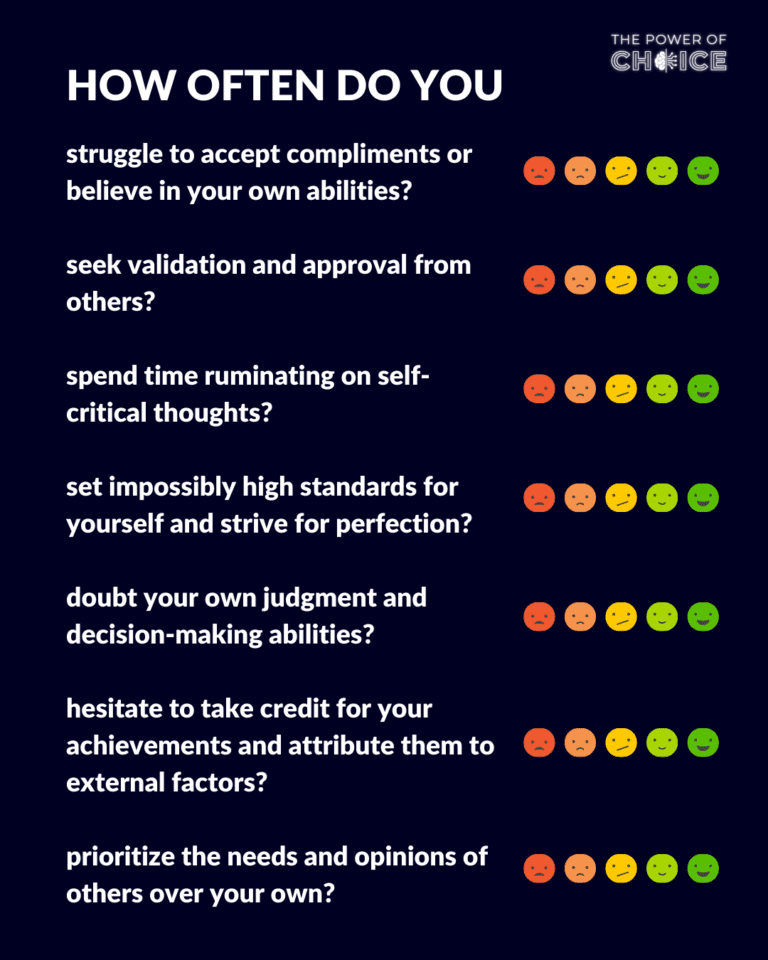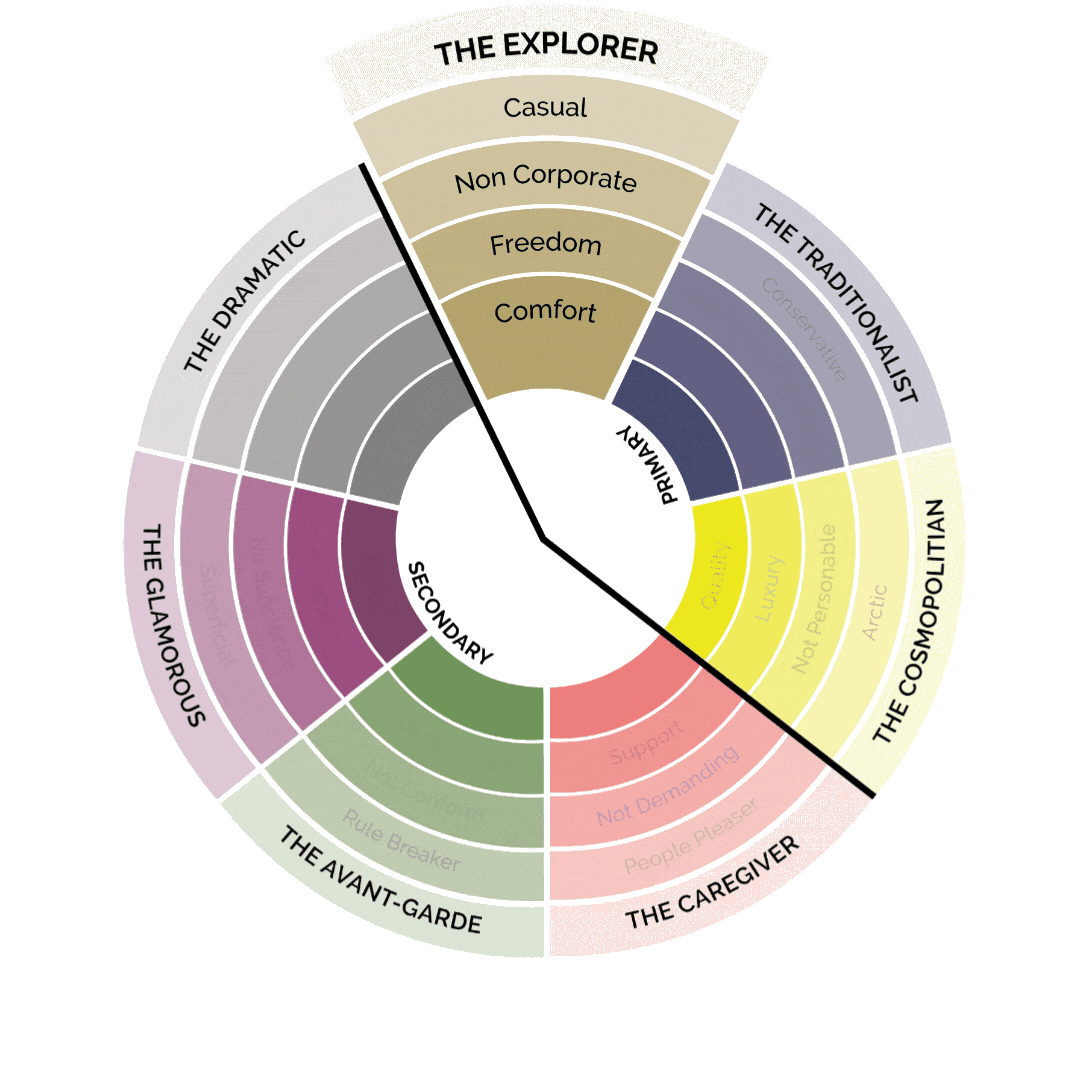Breaking Free from AND OVERCOMING Self-Criticism
Are you your own harshest critic? Do you find yourself constantly putting yourself down and scrutinizing every aspect of your performance, questioning your abilities and achievements at every turn? Self-criticism can manifest as a relentless inner voice, highlighting every flaw, mistake, or perceived inadequacy, and overshadowing your accomplishments. It’s a behavior that many professionals struggle with, often without even realizing the impact it has on their well-being and success.
Let’s dive into the complexities of self-criticism, exploring its origins, the toll it takes on your self-esteem and communication, and most importantly, practical strategies to break free from its grip. By gaining awareness, cultivating self-compassion, and adopting a healthier mindset, you can transcend self-criticism and embrace your fair advantage for personal and professional growth.
Step 1: Understanding the Burden of Self-Criticism
Self-criticism can become an immense burden that weighs heavily on your personal and professional life. It’s important to grasp the detrimental effects it can have on your self-esteem, communication skills, and overall well-being. By understanding the true weight of self-criticism, you can begin to address and alleviate its negative impact.
Here are five signs that indicate the burden of self-criticism:
Anxiety and Stress:
Constantly criticizing yourself creates a perpetual state of anxiety and stress. The fear of not meeting your own high expectations and the relentless self-judgment can contribute to heightened levels of anxiety, making it difficult to relax and find peace of mind.
Depression and Low Mood:
Self-criticism can take a toll on your mental health, leading to feelings of sadness, hopelessness, and low self-worth. The relentless self-judgment and negative self-talk can contribute to a cycle of negative emotions, impacting your overall mood and well-being.
Eating Disorders and Body Image Issues:
Negative self-perception can manifest in unhealthy behaviors related to body image and food. Self-criticism often fuels unrealistic standards of beauty and creates an unhealthy relationship with food, leading to disorders such as anorexia, bulimia, or binge eating.
Difficulty Coping with Challenges:
When self-criticism becomes ingrained, it hinders your ability to cope with challenges effectively. Rather than viewing setbacks as opportunities for growth, you may perceive them as personal failures, intensifying self-criticism and impeding your resilience.
Impaired Relationships:
Excessive self-criticism not only affects your relationship with yourself but also impacts your interactions with others. Constantly putting yourself down can create barriers to forming genuine connections and hinder effective communication, as self-doubt and negative self-perception can undermine your confidence in social interactions.
Recognizing these signs allows you to acknowledge the weight that self-criticism carries in your life. It is important to address and transform this burden into a catalyst for personal growth and self-compassion.
Step 2: Acknowledging the Source of Self-Criticism
It’s crucial to delve into the root cause of self-criticism and its impact on various aspects of your life, including self-esteem, communication skills, and overall well-being. By understanding the underlying factors that contribute to self-criticism, you can begin to address and overcome this harmful pattern. Sources can include
Unrealistic Expectations:
Holding yourself to impossibly high standards can fuel self-criticism. You may set unrealistically high expectations for your performance, constantly striving for perfection and berating yourself for any perceived shortcomings.
Comparison and Social Pressure:
The pervasive culture of comparison and social pressure in the workplace can be a breeding ground for self-criticism. Constantly comparing yourself to others’ achievements and feeling the need to meet societal expectations can lead to a harsh self-evaluation.
Past Failures and Criticism:
Negative experiences, such as past failures or critical feedback, can leave a lasting impact on your self-perception. Lingering self-doubt and fear of making similar mistakes can amplify self-criticism.
Imposter Syndrome:
Many professionals experience imposter syndrome, the persistent belief that they are frauds and will be exposed as inadequate. This self-doubt can fuel self-criticism, as individuals may attribute their achievements to luck or external factors rather than acknowledging their skills and capabilities.
Internalized Criticism:
Growing up in environments where criticism was prevalent or receiving harsh feedback from authority figures can internalize a critical voice within yourself. This inner critic becomes a constant presence, scrutinizing your every move and undermining your self-confidence.
By recognizing these sources of self-criticism, you can begin to challenge and reframe negative self-talk. It’s essential to cultivate self-compassion, embracing your imperfections and treating yourself with kindness and understanding. Building resilience and developing realistic expectations are also key in breaking free from the cycle of self-criticism.
Step 3: Identifying Signs of Unhealthy Self-Criticism
To effectively address self-sabotaging patterns, it’s crucial to be aware of the signs that indicate you may be engaging in unhealthy self-criticism. By recognizing these signs, you can take proactive steps towards breaking free from self-sabotage and nurturing a healthier mindset. Here are five key signs to watch out for:
Routinely Putting Yourself Down:
Do you find yourself constantly belittling your accomplishments, skills, or attributes? Regularly putting yourself down and dismissing your achievements can indicate a pattern of unhealthy self-criticism. It’s important to recognize your worth and give yourself credit for your efforts and successes.
Never Feeling Satisfied with Your Results:
If you are never content with your outcomes, regardless of how well you perform or achieve, it may be a sign of unhealthy self-criticism. Setting impossibly high standards and constantly feeling disappointed with your results can drain your motivation and hinder your overall progress.
Obsessing Over Details While Missing the Big Picture:
While attention to detail is essential, obsessing over every minor flaw or imperfection can be detrimental. If you find yourself fixating on insignificant details and losing sight of the bigger picture, it may indicate an unhealthy tendency towards self-criticism. Learn to balance your focus on both details and the broader context to maintain a healthy perspective.
Neglecting Self-Care:
Putting your own well-being on the back burner can be a result of self-criticism. When you prioritize work or other responsibilities over self-care, such as neglecting rest, relaxation, or activities that bring you joy, it can indicate a lack of self-compassion. Remember that self-care is crucial for maintaining your overall health and success in all aspects of life.
Lacking Trust in Your Own Abilities:
Do you constantly doubt your capabilities and second-guess your decisions? A lack of self-trust can stem from self-criticism and undermine your confidence. Learning to trust your instincts and believe in your abilities is essential for personal and professional growth.
Recognizing these signs of unhealthy self-criticism empowers you to take the necessary steps towards self-compassion and personal development. In the upcoming sections of this blog post, we will explore practical strategies to overcome self-sabotaging patterns, build self-confidence, and foster a more positive and empowering mindset.
Step 4: Developing Strategies to Overcome Self-Criticism
Overcoming self-criticism is a journey towards nurturing a healthier mindset and embracing your fair advantage. Here are ten practical strategies to help you break free from self-sabotage and cultivate self-compassion, resilience, and confidence:
Become Aware of Self-Criticism Triggers:
Start by identifying the situations, thoughts, or circumstances that tend to trigger your self-critical tendencies. This awareness allows you to recognize when self-criticism arises and take proactive steps to address it.
Anticipate Self-Criticism:
By anticipating situations where self-criticism may arise, you can mentally prepare yourself and develop strategies to respond in a healthier way. This proactive approach helps you build resilience and maintain a positive mindset.
Shift Your Perspective:
When faced with criticism, whether from yourself or others, challenge the negative narrative by reframing it. Look for alternative interpretations or focus on the lessons and growth opportunities that criticism presents.
Change the Channel of Negative Thoughts:
Interrupt the cycle of self-criticism by consciously redirecting your thoughts. Engage in activities that distract your mind, such as engaging in hobbies, practicing mindfulness, or engaging in physical exercise.
Externalize Negative Thoughts:
Put your self-critical thoughts on paper through writing exercises. By externalizing your thoughts, you gain distance and perspective, making it easier to challenge their validity and replace them with more supportive and empowering beliefs.
Cultivate Self-Compassion:
Treat yourself with kindness and understanding. Practice self-compassion by acknowledging your flaws and mistakes without judgment, and offer yourself the same compassion you would extend to a friend facing a similar situation.
Challenge Unrealistic Standards:
Recognize and challenge the unrealistic standards you set for yourself. Embrace the idea that perfection is unattainable and that mistakes are a natural part of the learning and growth process.
Practice Self-Validation:
Acknowledge and celebrate your accomplishments, no matter how small. Validate your efforts and progress, and remind yourself of your unique strengths and qualities.
Seek Support:
Reach out to trusted friends, mentors, or professionals who can provide guidance, encouragement, and an objective perspective. Surrounding yourself with a supportive network can help counteract self-criticism and boost your self-confidence.
Embrace Growth Mindset:
Adopt a growth mindset that focuses on learning, improvement, and resilience. Embrace challenges as opportunities for growth rather than sources of self-criticism. Emphasize the progress you make along the way, rather than solely focusing on the end result.
By implementing these strategies, you can gradually overcome self-criticism, cultivate self-compassion, and unleash your fair advantage. Remember, self-criticism is a learned behavior that can be unlearned with practice, patience, and a commitment to your personal growth.
Embracing self-compassion and overcoming self-criticism is a transformative journey that empowers you to unlock your full potential and discover your fair advantage. The book “Discover Your Fair Advantage” provides a comprehensive roadmap to help you navigate this path of personal growth, offering practical strategies, insights, and exercises to build self-awareness, leverage your unique strengths, and enhance your professional branding. By delving into the book, you will gain valuable tools to break free from self-sabotaging patterns, cultivate a positive mindset, and thrive in the workplace. Don’t let self-criticism hold you back from achieving your goals and reaching new heights in your career. Take the first step towards unleashing your fair advantage by diving into the pages of “Discover Your Fair Advantage” today. Your journey to self-discovery and professional success awaits.
OVERCOMING SELF-CRITICISM AT WORK IN A NUTSHELL




PS: Interested in more content like this? Make sure to follow me on Instagram. It’s where I visualize and publish my thoughts daily. I hope to see you there.




